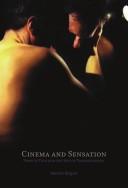| Listing 1 - 4 of 4 |
Sort by
|
Book
ISBN: 9781474403283 9781474403276 9781474409520 147440328X 1474409520 Year: 2016 Publisher: Edinburgh : Edinburgh University Press,
Abstract | Keywords | Export | Availability | Bookmark
 Loading...
Loading...Choose an application
- Reference Manager
- EndNote
- RefWorks (Direct export to RefWorks)
Develops an account of non-normative feminist cinematic ethics and a fresh methodological approach to film-philosophy.
Professional ethics. Deontology --- Film --- Denis, Claire --- Levinas, Emmanuel --- Nancy, Jean-Luc --- Motion pictures --- Feminist ethics. --- Moral and ethical aspects. --- Denis, Claire, --- Lévinas, Emmanuel --- Criticism and interpretation.
Book
ISBN: 147440328X 1474409520 9781474403283 1474403271 9781474403276 9781474409520 Year: 2016 Publisher: Edinburgh : Edinburgh University Press,
Abstract | Keywords | Export | Availability | Bookmark
 Loading...
Loading...Choose an application
- Reference Manager
- EndNote
- RefWorks (Direct export to RefWorks)
Develops an account of non-normative feminist cinematic ethics and a fresh methodological approach to film-philosophy.
Motion pictures --- Feminist ethics. --- Moral and ethical aspects. --- Denis, Claire, --- Lévinas, Emmanuel --- Nancy, Jean-Luc --- Criticism and interpretation. --- Ethics --- Feminism --- Moral and ethical aspects --- Lévinas, E. --- Leṿinas, ʻImanuʼel --- Levinas, Emani︠u︡el --- לוינס׳ עמנואל --- לוינס, עמנואל --- Līfīnās, Īmānwāl --- ليفيناس، إيمانوال --- Professional ethics. Deontology --- Film --- Denis, Claire --- Levinas, Emmanuel --- Lévinas, Emmanuel --- Nancy, Jean-Luc. --- Levinas, Emmanuel.
Book
ISBN: 9780231176941 0231176945 9780231176958 0231176953 9780231851039 Year: 2016 Publisher: London Wallflower Press
Abstract | Keywords | Export | Availability | Bookmark
 Loading...
Loading...Choose an application
- Reference Manager
- EndNote
- RefWorks (Direct export to RefWorks)
"With its increasing presence in a continuously evolving media environment, the essay film as a visual form raises new questions about the construction of the subject, its relationship to the world, and the aesthetic possibilities of cinema. In this volume, authors specializing in various national cinemas (American, Cuban, French, German, Israeli, Italian, Lebanese, Russian) and critical approaches (historical, aesthetic, postcolonial, feminist, philosophical) explore the essay film and its consequences for the theory of cinema while building on and challenging existing theories. Taking as a guiding principle the essay form's dialogic, fluid nature, this volume examines the potential of the essayistic to question, investigate, and reflect on all forms of cinema--fiction film, popular cinema, documentary, video installation, and digital essay. A wide range of filmmakers are covered, from Dziga Vertov (Man with a movie camera), Chris Marker (Description of a struggle), Nicoláa Guillén Landrián (Coffea arábiga), Pier Paolo Pasolini (Notes for an African Oresteia), Chantal Akerman (News from home), Mohammed Soueid (Civil war), Claire Denis (L'intrus), and Terrence Malick (The tree of life), among others. This volume argues that the essayistic in film--as process, as experience, as experiment--opens the road to key issues faced by the individual in relation to the collective, but can also lead to its own subversion, as a form of dialectical thought that gravitates towards crisis"--Back cover.
film --- filmtheorie --- essayfilm --- experimente film --- documentaire --- Vertov Dziga --- Marker Chris --- Guillen Landrian Nicolas --- Pasolini Pier Paolo --- Akerman Chantal --- Godard Jean-Luc --- Moretti Nanni --- Soueid Mohammed --- Denis Claire --- Malick Terence --- twintigste eeuw --- eenentwintigste eeuw --- filmgeschiedenis --- 791.41 --- Essay films --- Experimental films --- History and criticism. --- Films expérimentaux --- Histoire et critique --- Film

ISBN: 9780748649365 0748649360 9780748620425 9780748629176 0748629173 1281251968 9781281251961 0748620427 9786611251963 6611251960 074867084X Year: 2007 Publisher: Edinburgh Edinburgh University Press
Abstract | Keywords | Export | Availability | Bookmark
 Loading...
Loading...Choose an application
- Reference Manager
- EndNote
- RefWorks (Direct export to RefWorks)
This book looks at a much-debated phenomenon in contemporary cinema: the re-emergence of filmmaking practices (and, by extension, of theoretical approaches) that give precedence to cinema as the medium of the senses. France offers an intriguing case in point here. A specific sense of momentum comes from the release, in close succession, of a series of films that exemplify a characteristic awareness of cinema's sensory impact and transgressive nature: Adieu; A ma soeur; Baise-moi; Beau Travail; La Blessure; La Captive; Dans ma peau; Demonlover; L'Humanité; Flandres; L'Intrus; Les Invisibles; Lady Chatterley; Leçons de ténèbres; Romance; Sombre; Tiresia; Trouble Every Day; Twentynine Palms; Vendredi soir; La Vie nouvelle; Wild Side; Zidane, un portrait du XXIème siècle. These films, amongst others, typify a willingness to explore cinema's unique capacity to move us both viscerally and intellectually. Martine Beugnet focuses on the crucial and fertile overlaps that occur between experimental and mainstream cinema. Her book draws on the writings of the likes of Deleuze, Merleau-Ponty and Bataille, but first and foremost, she develops her arguments from the films themselves, from the comprehensive description of specific sequences, techniques and motifs which allows us to engage with the works as material events and as thinking processes. In turn, she demonstrates how the films, envisaged as forms of embodied thought, offer alternative ways of approaching those questions that are at the heart of today's most burning socio-cultural debates: from the growing supremacy of technology, to globalisation, exile and exclusion, these are the issues that appear embedded here in the very texture of images and sounds.
film --- filmtheorie --- sensoriële cinema --- zintuiglijkheid --- eenentwintigste eeuw --- twintigste eeuw --- Grandrieux Philippe --- Dieutre Vincent --- Denis Claire --- Resnais Alain --- Assayas Olivier --- Bonello Bertrand --- Carax Leo --- Lifschitz Sébastien --- Akerman Chantal --- Frankrijk --- filmgeschiedenis --- 791.41 --- Senses and sensation in motion pictures. --- Human body in motion pictures. --- Motion pictures --- Body, Human, in motion pictures
| Listing 1 - 4 of 4 |
Sort by
|

 Search
Search Feedback
Feedback About UniCat
About UniCat  Help
Help News
News